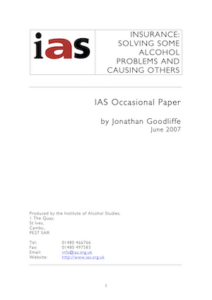View this report

Problem drinking may lead to financial problems for the drinker and those affected by his behaviour. In England 21% of adults have an alcohol use disorder likely to cause problems for them. 3.6% of adults are alcohol dependent (i.e. in common language they might be labelled “alcoholics”).
Alcohol is a proven factor often causing or contributing to the occurrence of many risks against which insurance is commonly taken out. These include, for instance, death and ill health, crime, accidents (including motor accidents) and fire. There are other risks in relation to which a link with problem drinking has been suggested but has yet to be scientifically established. These include professional negligence and marine collisions.
Insurance can sometimes pay for treatment for the effect of alcohol misuse. It can help to meet the cost of alcohol related harm. Sometimes the insured may be encouraged to avoid alcohol problems, by risk management procedures required by the insurer or by the prospect of paying higher premiums if those procedures are not adopted.
Often alcohol related risks may be excluded from the scope of the cover. Sometimes the non-payment of an insurance claim is an alcohol problem in its own right. Nondisclosure of (among other things) problem drinking by the person applying for cover (“the proposer”) may invalidate the insurance. Insurance can also be problematic when it contributes to dangerous behaviour by protecting people from the consequences, as when an alcoholic makes a suicide attempt believing that his family will be able to claim on his insurance.
This paper focuses on the non-disclosure issues whilst also touching other aspects of insurance’s relationship with alcohol related risk. I hope to show that there are areas of common interest between the field of alcohol studies on the one hand and of insurance on the other. Focus on common ground may lead to the development of more constructive policies for the reduction of alcohol related harm, for the management of alcohol related risk and for the development of fairer sales techniques.
View this report
